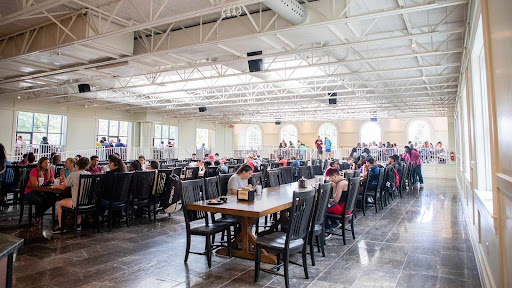College students face challenges with juggling classes, assignments, social relationships and personal well-being. This can distract them from basic needs such as eating at least three meals daily. It may sound simple to sit down and eat between breaks, but for many students, their first available meal might not come until as late as 7 p.m. What can we expect when these students take a break from eating?
Poor eating habits can affect students both physically and mentally. They may experience a drain of energy and need help focusing in the classroom or on assignments. Studies show this can lead to depression, anxiety, stress and possibly an eating disorder.
Nina Lief-Stetson, a sophomore double majoring in biology and criminal justice, starts her day at 8 a.m. with back-to-back classes and labs for both classes. After her Spanish class — during the only break she usually has — she goes to the library to study and complete homework with a few friends. After she takes that break, she makes her way to her lab which often ends at 6 p.m.
“Every day I struggle with deciding between taking a nap or getting a quick snack,” she said. “Some days I don’t even eat at all.”
Being a double major, her workload stresses her out and she barely has time for herself. Her meal plan only allows her to have 100 swipes for the entire semester. One hundred swipes are meant to cover three meals a day for the semester.
She believes that even though most students here are adults with more responsibilities, they should always put themselves first, even if it means taking a day to rest.
Mary Martinez, a junior majoring in public health says she hardly ever eats on campus because of the limited options.
“I feel like we should have more options on campus,” she said. “I end up getting bored of eating the same stuff every day.”
Unlike Lief-Stetson, Martinez does have more free time on her hands but still skips meals because of this predicament. She even mentions that she can’t afford to eat off-campus so she waits for her family to visit each week to bring her food. Her family brings over boxes of chips, dinner leftovers and a selection of frozen goods.
Recognizing These Habits
To recognize these habits of low eating, look for physical signs like being underweight. Signs of fatigue, stomach pains and illness from a compromised immune system can also occur. Some behavioral signs to look for from yourself and others are private eating, excuses for not eating or skipping meals entirely. Unhealthy eating can have the effects of anorexia, hair and weight loss, and other disturbances. Most people choose to ignore these signs, leading to harsh effects such as an eating disorder.
If you notice someone with poor eating habits, you can encourage healthier eating, cook healthy meals at home, provide smaller portions and support their goals without criticism. It may be difficult at first to break this habit, but consistency can improve the outcome.
How Can Students Create Better Habits?
Scheduled meal times, social eating, meal prep and healthy snacks are all great ways to establish better eating habits. Even if it’s a quick snack, scheduling times to eat can help prevent skipping meals. At the start of the week, prepping meals can save time to avoid the stress of wondering about what to cook each day or where to eat.
Adjusting to academics, social life and mental health can’t always be easy for college students, but by creating healthier eating habits, students can avoid setting themselves up for failure and excel in both academic and personal life.







